Students who like school and care about graduating make better choices about sex, according to a new report from the advocacy group Colorado Youth Matter.
The report, released last week, revealed that students with positive attitudes about school have intercourse with fewer partners and use birth control more often.
Lisa Olcese, executive director of Colorado Youth Matter, said it was the report’s most compelling finding and a call to action for educators.
It speaks “to the importance of engaging the whole student,” she said. “Connectedness at school is a protective factor, so how does each school community think about that?”
The report, which comes on the heels of a New York Times story highlighting Colorado’s surprising success in reducing teen pregnancy, fleshes out state trends in teen sexual activity and pregnancy rates.
Among the report’s other findings:
- Teens who have teachers, relatives or other adults with whom they feel comfortable discussing sensitive issues are more likely to delay sexual intercourse, have fewer sexual partners and use condoms.
- Latina teens have the highest birth rate among racial and ethnic groups in Colorado, but have also experienced the greatest decline—71 percent—since 2000.
- A decade ago, Denver and Adams County were among the 10 Colorado counties with the highest teen birth rates. Both have now dropped out of the top 10—closely tracking statewide reductions that observers credit to an initiative to provide long-acting contraceptives to teens and poor women.
- The counties with the highest teen birth rates are now all rural, though all have much lower rates than the top 10 counties a decade ago.
- Colorado’s rate of HIV infection among teens increased from 2013 to 2014—most significantly in Denver—but it’s still below national levels.
- Lesbian, gay, bisexual and transgender youth are at much higher risk of being bullied or sexually assaulted at school.
The “State of Adolescent Health in Colorado” report is available for $8 from Colorado Youth Matter.


